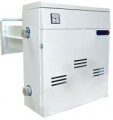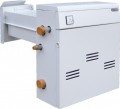Type
Depending on the set of functions, boilers are divided into single-circuit and dual-circuit.
-
Single-circuit boilers are equipped with one heat exchanger, in which the heat from fuel combustion is transferred to the heat medium of the heating system. The only function of such boilers is space heating. It is technically possible to use single-circuit boilers to provide hot water, but this requires an additional tank (the so-called indirect water heater).
- In
dual-circuit boilers, the primary heat exchanger is supplemented by a secondary one. Due to this, such a boiler, in addition to heating the room, also provides a hot water supply. In this case, both running water and water accumulated in a special tank(see Built-in water heater tank) can be used.
Heating circuit max. pressure
The maximum pressure in the heating circuit of the boiler, at which it remains operational, and there is no risk of physical damage to the structure. For a heating system, the maximum pressure is usually about 3 bar, and for a domestic hot water circuit up to 10 bar. When the maximum pressure is exceeded, a safety valve is activated, and part of the water is discharged from the system until a normal pressure level is reached.
Performance (ΔT ~30 °C)
The performance of a dual-circuit boiler in hot water mode when water is heated by approximately 30 °C above the initial temperature.
Performance is the maximum amount of hot water the unit can produce in a minute. It depends not only on the power of the heater as such, but also on how much water needs to be heated: the higher the temperature difference ΔT between cold and heated water, the more energy is required for heating and the smaller the volume of water with which the boiler can handle in this mode. Therefore, the performance of dual-circuit boilers is indicated for certain ΔT — namely 25 °C, 30 °C and/or 50 °C. And it is worth choosing according to this indicator, taking into account the initial water temperature and taking into account what kind of hot water demand there is at the installation site of the boiler (how many points of water intake, what are the temperature requirements, etc.). Recommendations on this subject can be found in special sources.
We also recall that water begins to be felt by a person as warm somewhere from 40 °C, as hot — somewhere from 50 °C and the temperature of hot water in central water supply systems (according to official standards) is at least 60 °C. Thus, for the boiler to operate in the mode ΔT ~ 30 °C and give out at least warm water at 40 °C, the initial temperature of cold water should be about 10 °C (10 + 30=40 °C). A similar temperature can be found in wells in the warm season, and cold water in the ce...ntralized water supply system often warms up to 10 °C in the warm season. However, boilers, including dual-circuit boilers, are switched on mainly in cold weather, when the initial water temperature is noticeably lower. Accordingly, if the boiler is used as the main water heater, heating to the claimed temperatures (see "DHW min. T", "DHW max. T") often requires a greater ΔT than 30 °C, and the performance is less than indicated in this paragraph. But when operating in the preheating mode (when the water is heated to the desired temperature by an additional device like a boiler), this parameter describes the capabilities of the unit very reliably.
Mains water intake
The diameter of the pipe for connecting the pipe through which cold water is supplied to the boiler for heating and use in the hot water supply system.
Diameters are indicated in inches. It is allowed to connect a pipe of a different diameter through an adapter, but the best option is still a match in size. There are connection options
1/2",
3/4",
1" and
1 1/2".
DHW flow
The diameter of the pipe for connecting the pipe through which hot water leaves the boiler for the DHW system.
Diameters are indicated in inches. It is allowed to connect a pipe of a different diameter through an adapter, but the best option is still a match in size.

